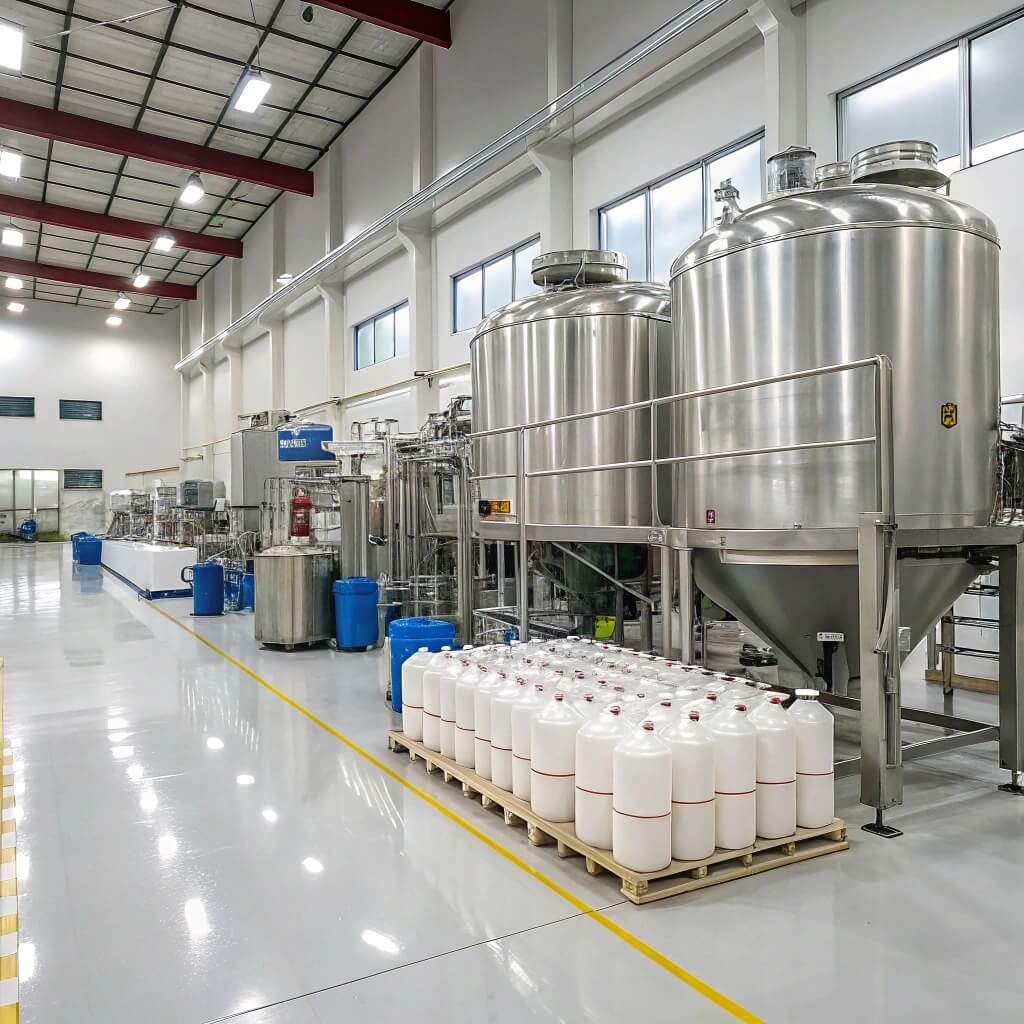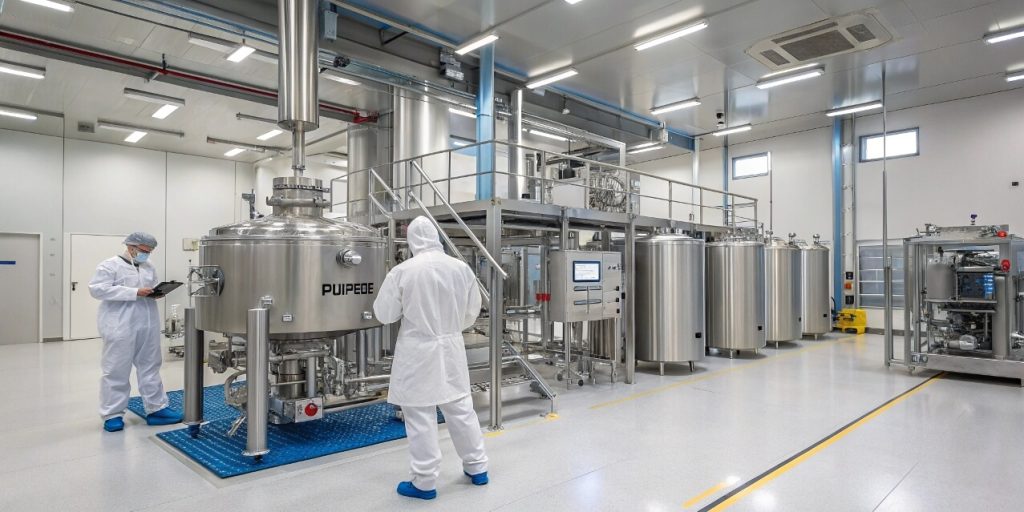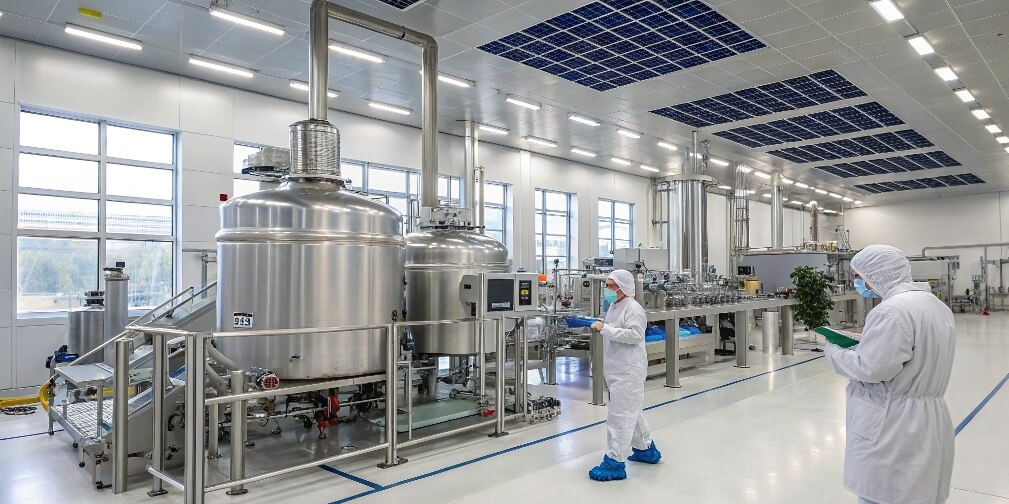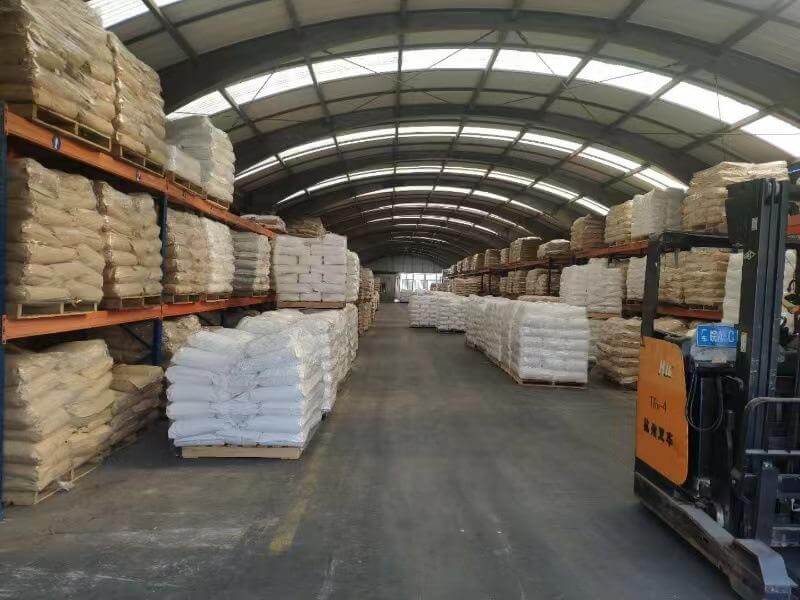Finding stable HPMC supply in today's fragmented market often leaves procurement teams stuck with unreliable quality or delayed shipments.
HPMC manufacturers offering bulk exports include established factories in China, Germany, Japan, and India. These suppliers vary in production capacity, quality control, and export capabilities, with most bulk-friendly options located in Asia due to cost-effective manufacturing infrastructure.
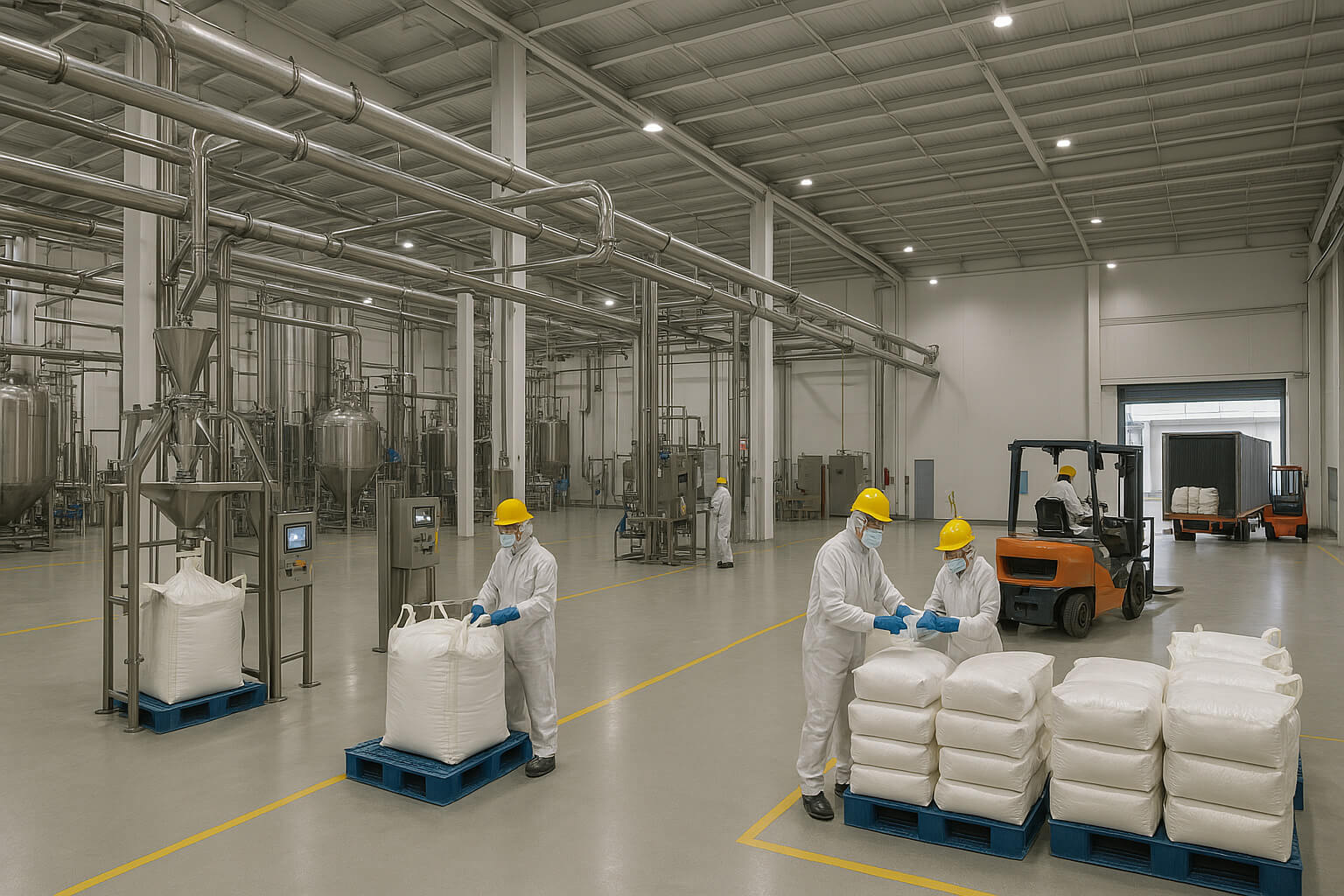
Industrial HPMC production line showing large-scale manufacturing capabilities with workers packaging product in bulk containers for export shipping
Let's examine your options for securing reliable HPMC supply chains through qualified bulk manufacturers while avoiding common procurement pitfalls.
What are the global trends in HPMC manufacturing and bulk export?
Supply chain disruptions have pushed many construction material companies to seek multiple HPMC suppliers instead of single-source partnerships.
The global HPMC manufacturing landscape has shifted toward Asia-Pacific dominance, with China producing over 60% of world supply. European and North American manufacturers focus on premium grades while Asian factories compete on price and volume capacity for construction and pharmaceutical applications.
The HPMC manufacturing industry has evolved significantly over the past decade. Our production team has observed firsthand how market dynamics have changed since we began operations. China has emerged as the leading exporter due to several advantages: lower production costs, significant manufacturing capacity expansion, and improvements in quality control systems that now meet international standards.
We've noticed three key trends reshaping the HPMC bulk export landscape. First, buyers increasingly demand product customization for specific applications rather than standard grades. Second, sustainability certifications have become more important as global regulations tighten across supply chains. In our manufacturing processes, we've implemented more environmentally friendly production methods to meet these new market expectations. Third, logistics optimization has become crucial as shipping costs fluctuate, with manufacturers offering flexible delivery options including CIF, FOB, and door-to-door services.
Regional Production Capacity Comparison
| Région | Annual Production Capacity (tons) | Export Volume (tons) | Main Applications |
|---|---|---|---|
| Chine | 150,000+ | 90,000+ | Construction, Pharma, Food |
| Europe | 40,000+ | 15,000+ | Pharmaceutical, Premium Construction |
| Inde | 25,000+ | 10,000+ | Generic Pharma, Construction |
| USA | 20,000+ | 5,000+ | Specialized Pharma, Food Grade |
The manufacturing capacity gap continues to widen between Chinese suppliers and other regions. Most North American and European buyers now source bulk HPMC from Asia while maintaining smaller European supply relationships for specialized grades or emergency supply needs.
How do you evaluate a reliable HPMC manufacturer for bulk orders?
Costly production delays often stem from selecting suppliers based solely on price without checking their actual manufacturing capabilities.
Evaluating reliable HPMC manufacturers for bulk orders requires assessment of production capacity, quality consistency, certification compliance, and export experience. The most dependable suppliers demonstrate consistent batch-to-batch stability and maintain transparent communication throughout the procurement process.
Finding the right HPMC manufacturer demands looking beyond initial price quotes. Based on our experience working with global customers, the most successful partnerships come from thorough evaluation of several critical factors. First, production capacity verification is essential - theoretical output numbers may differ from actual consistent delivery capabilities.
Quality management systems reveal much about a manufacturer's reliability. We recommend buyers request detailed documentation on quality control processes and testing methodologies. Certification GMP for pharmaceutical-grade HPMC or ISO certification for construction grades shows commitment to standardized manufacturing practices. In our factory operation, we maintain both certifications and conduct over 15 quality checkpoints throughout production.
Supply stability assessment should include examining the manufacturer's raw material sourcing strategy. Suppliers with diverse cellulose sources or long-term contracts with pulp providers can better weather market fluctuations. Export documentation experience also separates experienced bulk suppliers from newer market entrants - manufacturers should demonstrate familiarity with international shipping requirements, customs documentation, and bulk container optimization.
Sample testing represents a critical step that some procurement teams rush through. Request samples from multiple production batches to verify consistency rather than relying on a single perfect sample. Compare viscosity, substitution degree, particle size, and application performance across samples to confirm manufacturing stability.
What are the top HPMC manufacturers that support international trade?
Many procurement teams waste months with suppliers who lack proper export documentation or shipping experience for bulk materials.
The top HPMC manufacturers supporting international trade include Shin-Etsu (Japan), Dow Chemical (USA), Ashland (USA), SE Tylose (Germany), and several large Chinese manufacturers including Hopetop Pharmaceutical, Anhui Sunhere, and Morton Chemical. These companies have established export infrastructures for handling bulk orders efficiently.
The global HPMC manufacturing landscape includes several tiers of suppliers, each with distinct advantages for bulk buyers. Tier-one manufacturers like Shin-Etsu and Dow Chemical offer premium consistency but at significantly higher prices and with less customization flexibility. These suppliers typically serve pharmaceutical and food applications where regulatory requirements are strictest.
Chinese manufacturers have rapidly advanced in quality while maintaining cost advantages. Major producers have invested heavily in automated production lines, quality control laboratories, and export logistics systems. Our manufacturing facilities exemplify this evolution, with fully automated processes that ensure consistent quality across large-volume production runs.
European manufacturers like SE Tylose specialize in tailored HPMC formulations with precise substitution degrees and viscosity profiles. They excel in technical support but have more limited production capacity compared to Asian suppliers. Indian manufacturers have grown their market share by focusing on pharmaceutical grades, though construction-grade production has increased recently as demand for building materials grows.
When selecting from top manufacturers, consider alignment between your technical requirements and their specialization. Some focus exclusively on construction applications, while others maintain separate production lines for pharmaceutical, food, and industrial grades to prevent cross-contamination. The best manufacturers demonstrate transparency about their production capacity limitations rather than overpromising on delivery timelines.
How does Morton's HPMC manufacturing meet global bulk buyer needs?
Changing suppliers mid-project often causes formulation inconsistencies and application failures that cost construction companies thousands in waste and rework.
Morton's HPMC manufacturing meets global bulk buyer needs through a 30,000-ton annual production capacity, customization capabilities for viscosity and substitution degree, strict quality control, and efficient logistics solutions for international shipping. Our facilities specialize in construction-grade HPMC with batch-to-batch consistency.
As a factory with over a decade of experience, we've developed our manufacturing systems specifically for bulk export markets. Our production process begins with careful raw material selection - we source cellulose exclusively from sustainable forestry operations with consistent fiber characteristics. This raw material control translates directly to more consistent final product characteristics.
For construction applications, we manufacture HPMC in viscosity ranges from 5,000 to 150,000 mPa·s and methoxyl content from 19-30%, allowing customization for specific applications like tile adhesives, renders, and self-leveling compounds. Each production run undergoes rigorous testing both in-process and post-production to ensure properties match specifications.
Our quality control laboratory tests every batch for viscosity stability, particle size distribution, moisture content, and ash content. For construction-grade products, we conduct application testing to verify performance in mortar, rendering, and adhesive applications. This application-focused testing helps ensure the HPMC will perform as expected in your specific formulations.
For bulk export logistics, we've optimized our packaging and shipping processes to maximize efficiency. Our facility can package HPMC in various formats including 25kg paper bags on pallets, 500kg or 1000kg big bags, and container liner bulk packaging. We work with established shipping partners to ensure timely delivery to major ports worldwide, with typical lead times of 25-30 days to North America and 20-25 days to Europe from order confirmation.
What challenges do bulk HPMC buyers face and how to overcome them?
Procurement teams regularly encounter significant hidden costs when switching suppliers due to reformulation requirements and production downtime.
Bulk HPMC buyers face challenges including price volatility, quality inconsistency, logistics complexities, and import regulation navigation. These challenges can be overcome through establishing long-term supplier partnerships, implementing thorough quality verification processes, working with experienced freight forwarders, and maintaining detailed compliance documentation.
Based on feedback from our international customers, price fluctuation represents one of the most significant challenges for bulk HPMC procurement. Raw material costs, especially cellulose pulp prices, directly impact HPMC manufacturing costs. To mitigate this, we recommend establishing quarterly or semi-annual supply agreements rather than spot purchasing. These agreements typically include price adjustment mechanisms tied to raw material indices but provide more stability than transaction-by-transaction pricing.
Quality inconsistency between batches creates serious problems for construction material manufacturers. A slight change in HPMC characteristics can affect water retention, workability, and open time in mortars and renders. To overcome this, implement a robust supplier qualification program with sample testing across multiple batches before committing to large orders. Request and review manufacturer test data for previous bulk shipments to verify consistency over time.
Logistics coordination presents complex challenges, especially for container shipments. Work with freight forwarders experienced in chemical exports who understand proper documentation requirements and container specifications for powdered materials. Maintain buffer inventory to account for potential shipping delays, particularly during peak seasons or when routing through congested ports.
Import regulation compliance varies significantly between countries and regions. Manufacturers exporting to multiple countries must navigate different documentation requirements, tariff codes, and sometimes product registration processes. Develop a compliance checklist specific to each destination country and verify your supplier has experience with those markets. Request copies of previous successful import documentation as references.
Communication barriers can undermine otherwise solid supplier relationships. When working with international manufacturers, establish clear communication protocols including regular video conferences, written specification confirmations, and detailed purchase orders with all requirements explicitly stated. Consider working with suppliers who provide technical support in your local language or time zone for complex applications.
FAQ
Qui est le fabricant de HPMC ?
HPMC is manufactured by several companies globally. Major producers include Shin-Etsu (Japan), Dow Chemical (USA), Ashland (USA), SE Tylose (Germany), and numerous Chinese manufacturers including Morton Chemical. Each manufacturer has different specializations regarding grades, viscosity ranges, and application focus.
What is the price of HPMC per kg?
HPMC prices typically range from $3-15 per kg depending on grade, viscosity, purity level, and order volume. Construction-grade HPMC generally costs $3-7/kg for bulk orders, while pharmaceutical grades range from $7-15/kg. Prices fluctuate based on cellulose pulp costs, order quantity, and specific product customizations.
Which is better CMC or HPMC?
Neither CMC nor HPMC is universally "better" - each serves different applications optimally. HPMC offers better stability in alkaline environments (like cement), higher water retention, and thermal gelation properties. CMC provides stronger binding, higher transparency in solution, and is typically less expensive. The choice depends on your specific application requirements.
What is the bulk density of HPMC?
The bulk density of HPMC powder typically ranges from 0.25-0.70 g/cm³ depending on the production method and particle size distribution. Coarser grades used in construction applications usually have bulk densities of 0.40-0.50 g/cm³, while finer pharmaceutical grades may have lower bulk densities around 0.30-0.35 g/cm³.
Conclusion
Selecting the right HPMC manufacturer for bulk export requires balancing production capacity, quality consistency, customization capabilities, and logistics expertise. The global market offers options across different price points and specializations, with Asian manufacturers generally providing the most competitive bulk supply options while European and American producers focus on specialized grades.
We've seen firsthand how critical stable HPMC supply becomes when scaled to bulk volumes. Production interruptions or quality variations can cascade through your entire manufacturing process. By implementing thorough supplier evaluation protocols and establishing transparent communication channels, you can secure reliable HPMC supply for your construction or pharmaceutical applications. Contact Morton Chemical today to discuss your bulk HPMC requirements and learn how our manufacturing capabilities can support your specific application needs.

